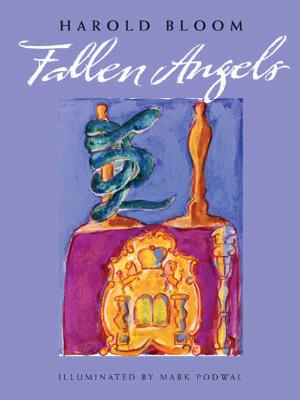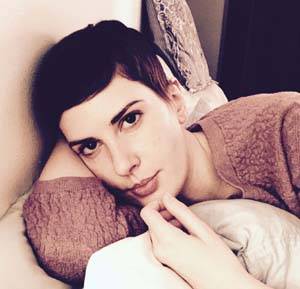 Harold Bloom’s literary personality contains multitudes: he is a biblical scholar, a Shakespearian and a critic of Romantic poetry – usually all at once. In his books, it’s often hard to separate these vocations, and Fallen Angels, a strange, hectic little essay that Yale University Press has deemed worthy of being placed between hard covers (with illustrations by the artist Mark Podwal), is no different. As the title suggests, it’s ostensibly about angels, but turns out to be about what Bloom’s books are usually about – that is, and in no particular order, the genius of Shakespeare, the Bible as literature and the saving, redemptive power of reading.
Harold Bloom’s literary personality contains multitudes: he is a biblical scholar, a Shakespearian and a critic of Romantic poetry – usually all at once. In his books, it’s often hard to separate these vocations, and Fallen Angels, a strange, hectic little essay that Yale University Press has deemed worthy of being placed between hard covers (with illustrations by the artist Mark Podwal), is no different. As the title suggests, it’s ostensibly about angels, but turns out to be about what Bloom’s books are usually about – that is, and in no particular order, the genius of Shakespeare, the Bible as literature and the saving, redemptive power of reading.
America, Bloom begins by arguing, is in the grip of a “post-millenial” obsession with angels. (Actually, Bloom doesn’t argue so much as smother the reader in great gusts of oracular chutzpah.) Angels, he says, are everywhere. A cursory Amazon search turns up Contacting Your Spirit Guide, Angels 101: An Introduction to Connecting, Working, and Healing with Angels and Angel Numbers, which latter is apparently a guide to the “angelic meanings” of numbers. And central to these effusions is the idea of “angelic intervention” and communication with angels.
Bloom thinks, reasonably enough, that such obsessions are sentimental evasions of the simple fact of human finitude. Nevertheless – and this is the most arresting provocation of an irrepressibly provocative book – he also thinks these preoccupations are redeemable. Bloom takes the Emersonian view that American religion is not the opiate but rather the “poetry of the people”, and that it can therefore be saved from the sentimentalism of contemporary “angelicism”. The key to this is getting us to see that angels, specifically fallen angels, are in fact images of a distinctively human predicament – that of a dying animal with transcendental longings.
To this end, Bloom applies his gargantuan erudition to the representations of fallen angels and devils which first emerged in the Zoroastrian faith of ancient Persia, before then being transmitted to Judaism and Christianity. Characteristically, he is entirely indifferent to questions of belief and unbelief; rather, Bloom prefers to treat the great Western religions as a series of “literary representations”. This means that Satan, the fallen angel par excellence, the “star figure” in this story, was a “literary character” long before Milton got his hands on him in Paradise Lost.
By appearing, as Blake put it, to be of the devil’s party, Milton brings us to the recognition that our relationship with Satan is an “intimate” one. Satan, or at least Milton’s Satan, fascinates and disturbs us precisely because we see ourselves in him. If, on Bloom’s account, Milton’s literary genius is outstripped by Shakespeare’s, it is because Shakespeare sees that there are more fallen angels than devils, that “we can be fallen angels without being demons or devils.”
For Bloom, therefore, “fallen angel” and “human being” are different names for the same condition. In his secular religion of literature, fallenness is stripped of its Pauline and Augustinian associations and becomes a synonym for what Philip Roth calls the “human stain” – the fact that, more often than not, we remain enigmatic to ourselves; simply put, the fact that we get things (and people) wrong.
Of course, this invites the question: why talk about “fallenness” at all, unless some of those theological associations in fact remain in play? Bloom’s answer, I suppose, would be that he talks like that because, for all his disdain for Saints Paul and Augustine, he still believes in redemption. Not redemption through Christ, needless to say, but redemption through literature. ■
Fallen Angels is published by Yale University Press

